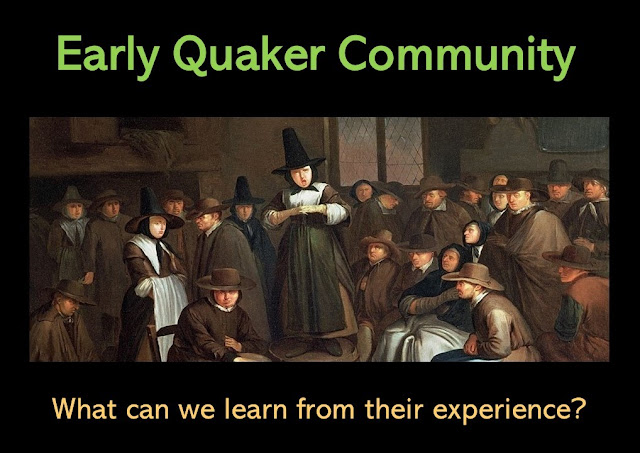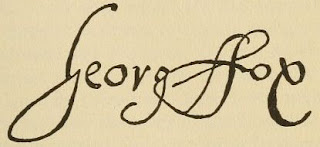A presentation made to Ireland Yearly Meeting on Friday 14th April 2023.
Building Quaker Community: The Experience of Early Friends
A. The Inspiration
1. A community united in one Spirit
Early Friends felt that their community was being gathered and held together by the living presence of Christ, active in Spirit within and among his people. This seems to have engendered a very strong sense of cohesion and unity that went beyond the usual limitations of human community. Because of this, the members of the early Quaker community might say, “we no longer live, but Christ lives in us (Galatians 2:20) and so, “we are all one in Christ Jesus (Galatians 3:28).
Thus, is the living God purifying his Temples, and he is making a Glorious situation, a Heavenly Habitation, and an Everlasting dwelling place in the sons and daughters of men; for God is now come to dwell in his people.
Dorothy White - A Visitation of Heavenly Love (1660)
Query: What do we feel binds us together? How can we strengthen this sense of unity?
2. A community that knows one another in the Eternal things
George Fox encouraged early Friends to know one another ‘in that which is eternal’. This points to the way Christ in Spirit forms and shapes the relationships between people (see John 1:1-3 “In the beginning was the Word, and the Word was with God, and the Word was God. He was in the beginning with God. All things came into being through him…”). Again, this a way of being a community that reaches beyond the normal limits of human experience.
And Friends meet together, and know one another in that which is eternal, which was before the world was… And here the love of God is shed abroad in the heart; and dwelling in love ye dwell in God, and from the life the eternal love doth flow, which life comes from the Father of life, whose love doth not change.
George Fox, Epistle 149 (1657)
Query: How well do we know each other? How can we share our deepest experiences and insights with one another?
3. A community of deep love and forgiveness
The earliest Friends identified strongly with the New Testament Johannine community, and in particular, the conviction that the true people of God live in a way that reveals a deep sense of love and forgiveness. “Beloved, let us love one another, because love is from God; everyone who loves is born of God and knows God” (1 John 4:7). When the world is full of hatred, conflict and injustice, God’s people are called to reveal a very different way, a taste of the kingdom yet to come:
Our life is love, and peace, and tenderness; and bearing one with another, and forgiving one another, and not laying accusations one against another; but praying one for another, and helping one another up with a tender hand.
Isaac Penington - Letter (1667)
Query: How is love and forgiveness revealed in our lives as a community? How can we deepen and strengthen this way of love and forgiveness?
4. A community that values a diversity of gifts
The apostle Paul’s description of the community as a body (1 Corinthians 12) was an inspiration for the early Quaker community. In recognising the diversity of gifts and ministry, all people can feel included and valued, and have an important role to play:
And Friends, have
a Care in your Meetings, to give due Honour unto every Member in the Body,
remembering none are useless, but stir up one another to their proper Service
in the House of God; and let not the Foot be troubled that it is not a hand,
nor the Hand that it is not an Eye; but everyone give Thanks that by the Grace
of God you are what you are; and be Faithful in your Place and Service, that he
may witness Growth.
Query: How do we discern, recognise, and encourage the diversity of gifts in our communities? What opportunities might we be we missing?
4. A community of mutual support and sharing
Early Friends raised funds and established systems to support travelling ministers, their families and those in prison. How do we support those exercising ministry and suffering persecution today?
5.-That collections be timely made for the poor, (that are so indeed,) as they are moved, according to order, -for relief of prisoners, and other necessary uses, as need shall require… 6.-That care be taken for the families and goods of such as are called forth into the ministry, or who are imprisoned for the truth's sake; that no creatures be lost for want of the creatures.
Epistle from the Elders at Balby (1656)
Query: In what ways are we using our money and other resources, both individually and communally, to actively support the public ministry of Friends?
5. A community that is spiritually nurtured and inspired
It seems that, in early Quaker communities, spiritual development and inspiration was encouraged by both elders and travelling ministers. Elder were based in the community and acted as ‘midwives of the Spirit’. Travelling ministers acted as the circulating life-blood of Quaker communities, bringing fresh challenge and inspiration.
Query: How can we deepen the spiritual lives of individual Friends and meetings? Where do we get our inspiration from? What is providing the circulating life blood of our community today?
B. The Challenges
1. A community that finds itself in conflict
Early Friends felt that the Spirit, if properly discerned, would avoid conflict and maintain unity and cohesion in their community. However, conflict was common, particularly around the issues of who had authority and the group’s relationship with the ‘World’. Conflict in community seems to be inevitable.
Query: Can we accept that conflict is inevitable within community? How can we work through conflicts in a respectful and productive way?
2. The tension between spiritual inspiration and communal order
A key challenge for the early Quaker community was how to establish structures and processes that enabled Friends to be an ordered people led by the free movement of the Spirit. They didn’t always succeed in this and the Spirit was easily quenched by a legalistic and authoritarian corporate discipline (what Margaret Fell called “a silly poor gospel”):
Dearly beloved Friends, these things we do not lay upon you as a rule or form to walk by, but that all, with the measure of light which is pure and holy, may be guided; and so in the light walking and abiding, these may be fulfilled in the Spirit, not from the letter, for the letter killeth, but the Spirit giveth life.
Postscript to Epistle from the Elders at Balby, 1656
Query: How are we balancing the need for good order and Spiritual inspiration? What is threatening good order? What is quenching the Spirit?
3. Messages of challenge and warning - How do we treat our prophets?
The early Quaker movement had a powerful prophetic dimension to it. Quaker preachers and writers were known for their impassioned and assertive messages. They challenged the religious, political, and economic injustices of their time in a clear and forceful way. Here, for example, is James Nayler in full prophetic mode:
God is against you, you covetous cruel oppressors who grind the faces of the poor and needy, taking your advantage of the necessities of the poor, falsifying the measures and using deceitful weights…and so deceiving the simple, and hereby getting great estates in the world, laying house to house and land to land till there be no place for the poor; and when they are become poor through your deceits then you despise them and exalt yourselves above them….
James Nayler – A Discovery of the First Wisdom (1653)
However, although this reflected the approach of the Hebrew prophets, the community tended to react very differently when the prophetic challenge was directed inwards. For example, those who challenged Quaker involvement in slavery were often ostracised and sometimes disowned.
Query: How do we treat the prophets within our midst, particularly when they discomfort us? Are we willing to listen to and hear their challenge?
4. The tension between the Quaker community and the wider social world
Early Friends defined themselves very much in opposition to ‘the world’ around them (human culture) which often persecuted them. Hence, theirs was a community that was tightly knit together in circumstances of conflict and adversity.
The God of heaven and earth...is risen in this nation in power & in life & light & in glory in his saints, in a people despised & hated of all or the most of men, not for any evil deeds nor any transgressions but for their separation from the rest of the people of the nations, & for living unto God in righteousness & true holiness, & so the scripture is fulfilled, they that depart from iniquity become a prey, & Christ's words is fulfilled who said, They should be persecuted & hated for his names sake & for no other cause.
Margaret Fell – Letter (1661)
Later, however, Friends presented themselves as a respectable and peaceable people who were no threat to ‘the world’. This enabled them to survive, but it also led to an active involvement in the injustices of the British Empire’s slave-based economy.
Query: How do we view the wider social world, and how do we manage our relationship with it? Can we discern what we should affirm and support, and what we must deny and resist?
C. The Queries
Query 1: What do we feel binds us together as a community today? How can we strengthen this sense of unity?
Query 2: How well do we know each other? How can we share our deepest experiences and insights with one another?
Query 3: How is love and forgiveness revealed in our lives as a community? How can we deepen and strengthen this way of love and forgiveness?
Query 4: How do we discern, recognise, and encourage the diversity of gifts in our communities? What opportunities might we be we missing?
Query 5: In what ways are we using our money and other resources, both individually and communally, to actively support the public ministry of Friends?
Query 6: How can we deepen the spiritual lives of individual Friends and meetings? Where do we get our inspiration from? What is providing the circulating life blood of our community today?
Query 7: Can we accept that conflict is inevitable within community? How can we work through conflicts in a respectful and productive way?
Query 8: How are we balancing the need for good order and Spiritual inspiration? What is threatening good order? What is quenching the Spirit?
Query 9: How do we treat the prophets within our midst, particularly when they discomfort us? Are we willing to listen to and hear their challenge?
Query 10: How do we view the wider social world, and how do we manage our relationship with it? Can we discern what we should affirm and support, and what we must deny and resist?



Comments
Post a Comment